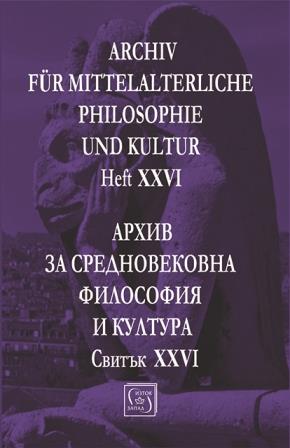За значението на prudentia (φρόνησις) в ранния XIII век
On the meaning of prudentia (φρόνησισ) in the early thirteenth century
Author(s): Oleg GeorgievSubject(s): Christian Theology and Religion, History, Philosophy, Metaphysics, Ethics / Practical Philosophy, Middle Ages, Theology and Religion, 13th to 14th Centuries
Published by: Издателство »Изток-Запад«
Keywords: Aristotle; Nicomachean Ethics; Early Latin commentators; prudentia; phronesis
Summary/Abstract: This article is devoted to the early commentators on Aristotle’s Nicomachean Ethics in the Early 13th century in the Latin Middle Ages. The choice of this century is not accidental, as the metamorphoses that Aristotle’s ethical teachings underwent in the face of the Christian moral paradigm are an extremely interesting phenomenon for researchers. The early commentators of his text accidentally found themselves in an extremely intriguing, but also very complex and ambiguous standpoint in their attempt to determine the nature of the moral, not only in a Christian context but also from a new perspective - Aristotle’s ethical teaching. They attempted to discuss in detail the problem with the nature of practical rationality and the related decisions and actions against the background of the Christian idea of blessedness. These decisions and actions were relevant to the discussion of the nature of virtues and, above all, to the question of happiness in the aspect revealed by Aristotle. For this reason, they had to take on a difficult task – to theoretically substantiate the boundaries of the concept of prudentia (as the Latins translated φρόνησισ) in the thirteenth century.
Journal: Архив за средновековна философия и култура
- Issue Year: 2020
- Issue No: 26
- Page Range: 7-36
- Page Count: 30
- Language: Bulgarian
- Content File-PDF

